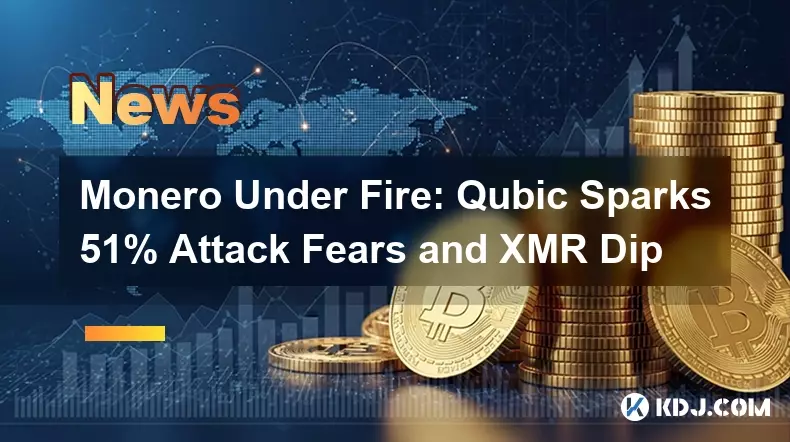Monero faces a security challenge from Qubic, sparking a hashrate battle and an XMR price dip. Is this a tech demo or a real threat?

Monero Under Fire: Qubic Sparks 51% Attack Fears and XMR Dip
The Monero network, known for its privacy features, has been recently rattled by Qubic's mining activities, leading to concerns over a potential 51% attack and a subsequent dip in XMR's price. Let's dive into what's happening.
Qubic's Rise and Monero's Response
In July 2025, Qubic, led by IOTA co-founder Sergey Ivancheglo, rapidly increased its mining efforts on Monero, reaching as high as 40% of the network's hashrate. This raised alarms within the Monero community, as such a large share of mining power could theoretically lead to transaction censorship or a 51% attack. Monero is built around the RandomX CPU-friendly mining algorithm, intentionally designed to keep mining decentralized. Qubic, by contrast, operates a “Useful Proof of Work” (uPoW) scheme. Profits from mining XMR are regularly converted into Tether (USDT) to support buybacks and token burns for Qubic, creating both a financial and narrative connection between the networks.
Community Mobilization and Market Reaction
The Monero community responded swiftly, coordinating a boycott of the Qubic pool. This resulted in Qubic's hashrate share dropping significantly. Despite this pushback, concerns about network centralization persist. The price of Monero experienced a decline of about 3%, while Qubic's token saw an appreciation, reflecting market sensitivity to the unfolding situation.
The Motivation Behind Qubic's Actions
Qubic claims its actions are a "tech demo" to expose vulnerabilities in proof-of-work systems. However, critics suggest it's also a publicity stunt to boost Qubic's visibility and token price. Regardless of the motivation, the incident highlights the economic centralization risks that can challenge even well-designed proof-of-work networks.
The Bigger Picture
This situation underscores the need for ongoing vigilance and adaptability in maintaining true decentralization. The Qubic & Monero episode reveals how even well-designed proof-of-work networks can be vulnerable if one party gains a large share of mining power, whether for demonstration or profit. While Monero’s community quickly pushed Qubic’s hashrate share down, this incident shows that economic threats & not just technical attacks can challenge network security. Going forward, Monero and similar networks may need to adopt further safeguards to prevent future hashrate concentration.
Looking Ahead
The ongoing Qubic episode is a real-world test of Monero’s decentralized philosophy and a timely lesson for every proof-of-work project. While the August 2–31 “demonstration” window remains ahead, the Monero community’s vigilant and coordinated response stands as the strongest defense. Whether this is ultimately remembered as an educational exercise, a marketing gambit, or an early warning about the economics of network security will depend on how both chains and communities evolve in the weeks to come.
So, what's the takeaway? The Monero community's quick response is definitely something to write home about. Let's see how this plays out, shall we?
Disclaimer:info@kdj.com
The information provided is not trading advice. kdj.com does not assume any responsibility for any investments made based on the information provided in this article. Cryptocurrencies are highly volatile and it is highly recommended that you invest with caution after thorough research!
If you believe that the content used on this website infringes your copyright, please contact us immediately (info@kdj.com) and we will delete it promptly.












































![Ultra Paracosm by IlIRuLaSIlI [3 coin] | Easy demon | Geometry dash Ultra Paracosm by IlIRuLaSIlI [3 coin] | Easy demon | Geometry dash](/uploads/2026/01/31/cryptocurrencies-news/videos/origin_697d592372464_image_500_375.webp)










































